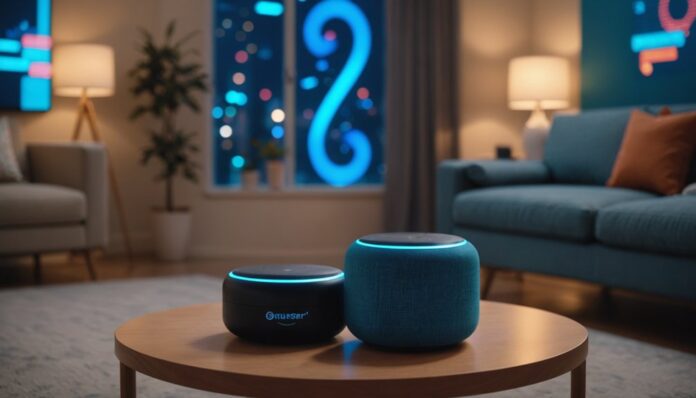AI voice assistants are undergoing significant changes this year, driven by advancements in natural language processing and machine learning. Enhanced conversational capabilities and improved multilingual support are enabling more human-like interactions. Integration with a broader range of third-party services is also streamlining user experiences. As AI voice assistants become increasingly sophisticated, they are ready to transform how individuals manage daily tasks, making it essential to investigate their developing capabilities.
Highlights
- AI voice assistants are evolving to control and automate a wider range of smart home devices for streamlined living experiences.
- Enhanced natural language processing capabilities enable more accurate and human-like conversations with AI voice assistants.
- Integration with more third-party services and devices expands the functionalities of AI voice assistants as a central hub for users’ lives.
- AI voice assistants are improving in personalization and contextual understanding to provide adaptive and relevant responses to users’ needs and preferences.
- AI voice assistants are playing a crucial role in shaping the future of retail through seamless voice commerce and shopping experiences.
Expanded Smart Home Automation Capabilities
As AI voice assistants continue to advance, one of the most significant areas of improvement is in their ability to control and automate various aspects of smart homes. Users can now seamlessly integrate and manage multiple devices, including lights, thermostats, and security cameras, with a unified voice command system.
Smart energy management is also becoming increasingly prevalent, allowing homeowners to optimize energy consumption and reduce waste. Additionally, automated security systems can be controlled and monitored remotely, providing users with an added layer of protection and peace of mind.
These advancements in smart home automation capabilities have increased the appeal of AI voice assistants, as users aim for a more streamlined and efficient living experience. Compatibility with diverse smart devices has also expanded.
Enhanced Natural Language Processing for Better Conversations
How effectively can AI voice assistants engage in conversations that feel natural and intuitive? Recent advancements in natural language processing (NLP) have greatly improved the conversational capabilities of AI voice assistants.
Enhanced multilingual support allows users to interact with voice assistants in their native language, breaking down cultural and linguistic barriers. Additionally, AI voice assistants can now better understand conversational circumstances, enabling them to respond more accurately and relevantly.
This improved understanding of circumstances also allows voice assistants to engage in multi-turn conversations, creating a more natural and human-like interaction experience. By leveraging these advancements, AI voice assistants can cultivate a sense of belonging and connection with users, making interactions feel more personalized and empathetic.
Conversations become more fluid and effective, driving user engagement and satisfaction.
Integration With More Third-Party Services and Devices
What role do third-party services and devices play in elevating the capabilities of AI voice assistants?
Integration with these external services and devices is essential in expanding the functionalities of AI voice assistants. Third-party collaborations enable voice assistants to tap into a broader range of services, such as food delivery, ride-hailing, and home security systems.
Service integration allows users to control multiple devices and services with a single voice command, creating a seamless experience. This year, AI voice assistants will integrate with even more third-party services and devices, further enhancing their capabilities and convenience.
As a result, users will enjoy a more connected and streamlined experience, with their voice assistants acting as a central hub for controlling various aspects of their lives.
Improved Personalization and Contextual Understanding
Numerous advancements in AI voice assistants are focused on developing improved personalization and situational understanding, enabling these systems to better comprehend user behavior, preferences, and intent.
By leveraging adaptive user profiles, AI voice assistants can tailor their responses to individual users, considering their unique preferences, habits, and interests.
Additionally, situational awareness allows these systems to understand the subtleties of human communication, such as tone, idioms, and implied meaning. This enables more accurate and relevant responses, nurturing a sense of belonging and understanding between the user and the AI assistant.
As a result, users can expect a more personalized and intuitive experience, with AI voice assistants that can adapt to their needs and preferences in real-time.
Increased Focus on Voice Commerce and Shopping
Building on the advancements in personalization and situational understanding, AI voice assistants are shifting their attention towards facilitating seamless voice commerce and shopping experiences.
This increased focus enables users to effortlessly purchase products, track orders, and access exclusive deals using voice commands. AI-powered voice assistants utilize machine learning algorithms to analyze shopping trends, providing users with personalized product recommendations and promotions.
Additionally, the integration of voice payment capabilities allows for streamlined transactions, reducing friction and enhancing overall user experience.
As voice commerce continues to gain traction, AI voice assistants are ready to play a crucial part in shaping the future of retail, offering unparalleled convenience and accessibility to consumers worldwide.
With each iteration, voice assistants refine their ability to cater to individual preferences.
Advancements in Emotional Intelligence and Empathy
As AI voice assistants become increasingly integrated into daily life, researchers are working to equip them with a critical human-like quality: emotional intelligence. This involves developing advanced emotional recognition capabilities, enabling AI assistants to accurately detect and interpret human emotions.
By doing so, AI assistants can provide more empathetic responses, encouraging a deeper sense of connection and understanding with users. Recent advancements in natural language processing and machine learning have made it possible for AI assistants to recognize emotional cues, such as tone of voice and linguistic patterns.
As a result, AI assistants can respond in a more personalized and compassionate manner, enhancing the overall user experience and promoting a sense of belonging. This emerging capability has significant implications for AI-powered customer service and social companionship.
Greater Compatibility With Wearable Devices and Cars
The integration of AI voice assistants with various devices is expanding beyond smartphones and smart speakers. Wearable integration is becoming increasingly prevalent, enabling users to access their virtual assistants directly from smartwatches, fitness trackers, and headphones.
This allows for a more seamless and convenient experience, as users can interact with their assistants without needing to physically access their phones.
Additionally, AI voice assistants are being integrated into automotive technology, enabling drivers to control their vehicles, access direction-finding, and play music using voice commands.
This integration enhances the driving experience, providing a safer and more connected experience on the road.
As AI voice assistants continue to evolve, their compatibility with various devices will play a significant role in shaping their future applications.
Enhanced Security Measures to Safeguard User Data
While AI voice assistants offer numerous benefits, their increased presence in various devices also raises concerns about user data security. To address these concerns, manufacturers are implementing enhanced security measures to safeguard user data.
One such measure is the integration of biometric authentication, which uses unique physical characteristics, such as voice or facial recognition, to verify user identities.
Additionally, AI voice assistants are utilizing data encryption to protect user information from unauthorized access. This involves converting data into unreadable code that can only be deciphered with the corresponding decryption key.
Conclusion
AI voice assistants are undergoing significant evolution this year, marked by enhanced natural language processing, expanded smart home automation, and increased integration with third-party services. Advancements in personalization, emotional intelligence, and voice commerce are also notable. Additionally, improved compatibility with wearable devices and cars, as well as enhanced security measures, are being implemented. These developments are altering user experiences, making voice assistants more intuitive, efficient, and secure.


